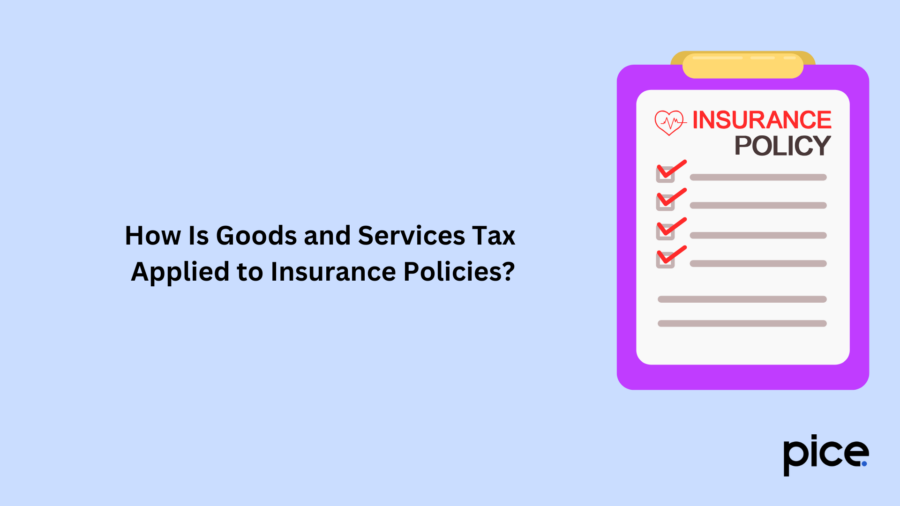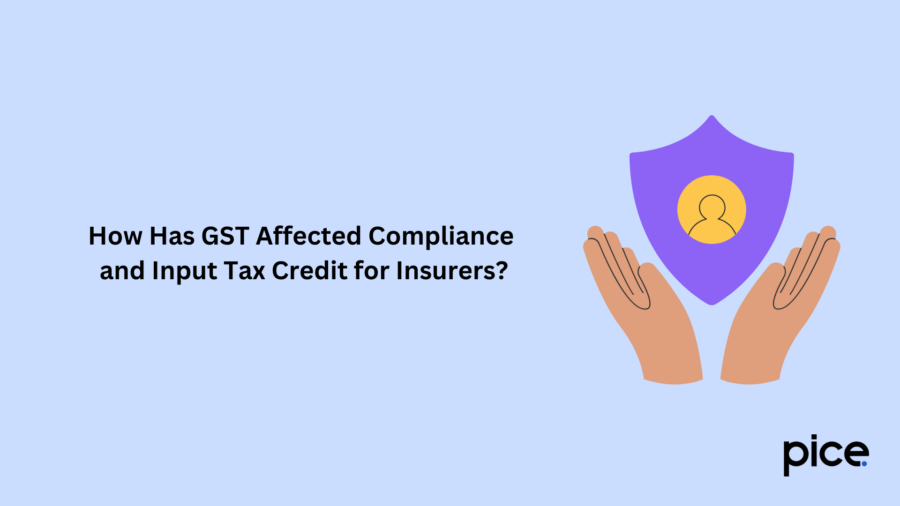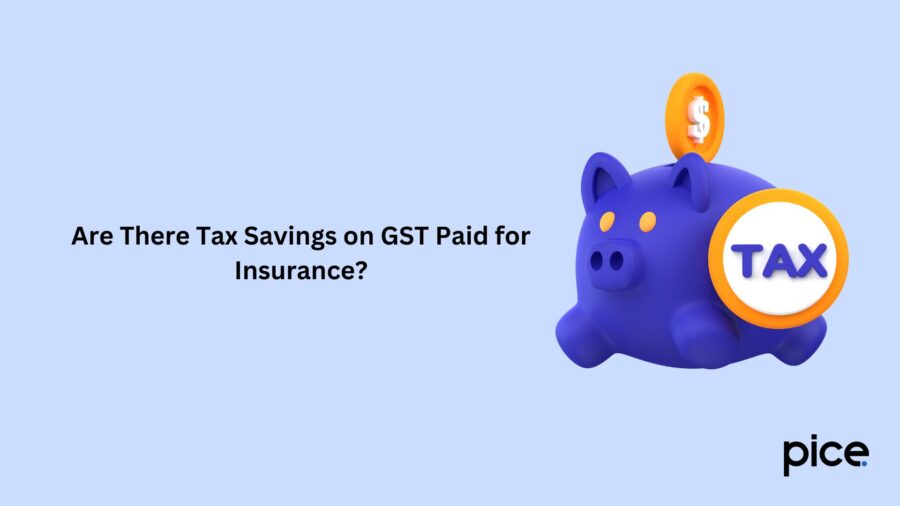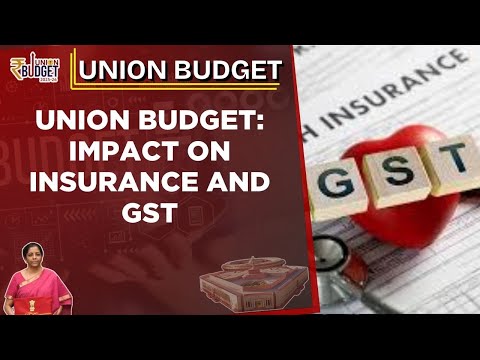Impact of GST on Insurance: Everything You Need to Know
- 6 Feb 25
- 8 mins

Impact of GST on Insurance: Everything You Need to Know
- How Is Goods and Services Tax Applied to Insurance Policies?
- GST Rates on Insurance Policies
- How Does GST Differ Among Various Insurance Types?
- How Has GST Affected Compliance and Input Tax Credit for Insurers?
- Policies Exempt from GST on Insurance
- Are There Tax Savings on GST Paid for Insurance?
- Conclusion
Key Takeaways
- GST on insurance varies, with rates like 18% for term plans and 4.5% for endowment plans.
- Insurers must follow GST rules, including invoicing and tax payments.
- Limited ITC increases costs for insurance companies.
- Some government schemes are GST-exempt.
- Tax benefits apply under Sections 80C (life) and 80D (health).
Being a destination-based tax, GST has replaced a multitude of indirect taxes like service tax, VAT, and central excise, among others. This change has enhanced taxation in this case by helping policyholders to pay taxes on premiums paid by calculating easy and convenient taxes on premiums paid.
The impact of GST on insurance has prompted some variations in the manner through which insurance premiums are being taxed. It is critical to understand how GST works with various insurance products if you are to make great choices for your insurance needs. In this blog, we will explore the GST rates for various policies and how they affect the overall cost of your premiums.
How Is Goods and Services Tax Applied to Insurance Policies?

GST has a profound impact on the products and services of insurance companies and firms as a result of introducing it. One of the greatest impacts is that insurance premiums have increased because of the adoption of the GST charge.
The law expects the insurers to include the GST while charging their customers for the premium amounts. The policyholder has to pay for the total of the premium inclusive of the tax amount. Implementing GST also requires the insurance companies to submit the returns on a GST basis and keep records of all activities, policyholder information, premiums received, GST levied, etc. All the above particulars must be furnished to the tax establishments before the prescribed time limit.
Non-compliance with the provision of the GST Act will attract penalties and fines among insurers. Policyholders should ensure they are dealing with insurers who are registered under the GST system and follow the required regulations to avoid any future issues.
GST Rates on Insurance Policies
Different types of life insurance policies fall under varying GST slabs. Here are some examples:
- Unit-Linked Insurance Plans (ULIPs): ULIPs are subject to an 18% GST rate. These policies include additional charges like fund management charges and entire premium allocation fees. The total life insurance premium paid under a ULIP is split into two parts: one for insurance and the other for investment. GST is not levied on the investment portion.
- Term Insurance Policies: These attract an 18% GST rate and are among the most affordable policies, providing coverage solely for mortality costs. For instance, if your annual premium under a term policy is ₹10,000, you will be charged a GST of ₹1,800 (18% of ₹10,000). Additional riders, such as accidental death benefits, also attract an 18% GST on the extra premium amount.
- Traditional Policies: These policies combine insurance and investment. A GST rate of 4.5% applies to the first-year premium, while subsequent premiums attract a 2.25% GST rate. For example, if the annual premium is ₹20,000, ₹900 will be charged as GST in the first year, and ₹450 in the following years.
- Pension Plans or Annuities: These include receiving a large amount of money for receiving a fixed income in the future. The GST is going to be applicable at 1.8% for the current suppliers. For instance, if a customer is willing to pay ₹10 lakh for ₹80,000 annual income, ₹18,000 will be the GST charged on the lumpsum payment.
How Does GST Differ Among Various Insurance Types?
The GST on insurance premiums varies depending on the type of insurance policy you choose. Here you will learn the GST rates for different life insurance plans:
- Unit Linked Insurance Plans (ULIPs)
ULIPs combine investment and insurance benefits. A portion of the premium is allocated for life cover, while the remaining is invested in market-linked funds.
For ULIPs, an 18% GST is applied to various charges like mortality (risk-related) charges, fund management fees, premium allocation, and policy administration costs. However, GST is not levied on the investment portion of the premium if it is separately disclosed to the policyholder.
- Endowment Plans
Endowment plans comprise both risk cover up for the life insured and the maturity benefits. The maturity benefit is paid to the policyholder who survives the policy term, however the life coverage pays an assured sum to the nominees in the event of the death of the policyholder.
GST on endowment plans is structured into two tiers:
- In the first year, GST is calculated at 4.5% on the full premium amount (18% GST on 25% of the premium as per Rule 32(4) of CGST Rules 2017).
- From the second year onwards, GST reduces to 2.25% (18% GST on 12.5% of the premium value).
For example, if the annual premium is ₹5,000, the GST will be ₹225 (4.5% of ₹5,000) in the first year and ₹112.5 (2.25% of ₹5,000) from the second year onward.
- Term Insurance
A term insurance policy offers pure life coverage without any maturity benefits. For these plans, an 18% GST is applied to the total premium, including any optional riders like accidental death coverage. For instance, if your annual premium is ₹10,000, the GST amount would be ₹1,800 (18% of ₹10,000).
- Single Premium Annuity Plans
These plans offer lifelong regular income in exchange for a one-time lump sum payment. The GST rate on the lump sum amount is 1.8% (18% GST on 10% of the premium value).
This classification highlights how GST differs across life insurance premium plans. It helps you better understand its impact based on your chosen policy.
How Has GST Affected Compliance and Input Tax Credit for Insurers?

The implementation of GST has introduced new compliance challenges and affected the availability of input tax credits for insurers:
- Compliance Challenges
Currently, life insurance organisations have been subjected to adhere to GST regulations regarding proper invoicing, timely payment, and proper reporting. These enhancements have burdened the insurers with higher administrative work, and the work requires efficiency in undertaking such tasks.
- Input Tax Credit (ITC)
Input tax credit allows businesses to offset the GST paid on inputs against their output GST liability. Insurers can claim ITC on certain operational expenses like office supplies and professional services. But ITC on GST paid for the services in relation to insurance policies, such as commission to agents, is restricted. This restriction affects the cost dynamics and, therefore, profits in insurance businesses.
Policies Exempt from GST on Insurance
In India, certain insurance policies are exempt from GST. Below are some well-known government insurance schemes that do not attract GST:
- Insurance coverage provided to personnel in the Navy, Army and Air Force by state and central governments
- Pradhan Mantri Vaya Vandana Yojana
- Aam Aadmi Bima Yojana
- Varishtha Pension Bima Yojana
- Pradhan Mantri Jan Dhan Yojana
Are There Tax Savings on GST Paid for Insurance?

Yes, GST on certain insurance premiums is eligible for tax benefits under specific conditions outlined in the Income Tax Act, 1961.
- Life Insurance: The GST paid on life insurance premiums qualifies for tax deductions under Section 80C, subject to a maximum limit of ₹1.5 lakh per year.
- Health Insurance: Under Section 80D of The Income Tax Act, 1961, the GST paid on health insurance premiums can be claimed as a deduction, subject to certain conditions. You are eligible to claim up to ₹1 lakh per year for premiums paid on policies for yourself, your spouse, children, and parents.
However, it is important to note that policies like car insurance and home insurance do not qualify for any tax benefits under the Income Tax Act, 1961.
Conclusion
The impact of GST on insurance has been remarkable. Various types of insurance policies charge different GST rates on the basis of their nature. Whether you are investing in term insurance, ULIPs, or endowment plans, understanding these tax implications can help you budget accordingly.
Additionally, while certain policies qualify for tax deductions, others like car or home insurance do not. Staying informed about the GST structure can assist you in making better financial decisions.
💡If you want to streamline your payment and make GST payments via credit card, consider using the PICE App. Explore the PICE App today and take your business to new heights.



















